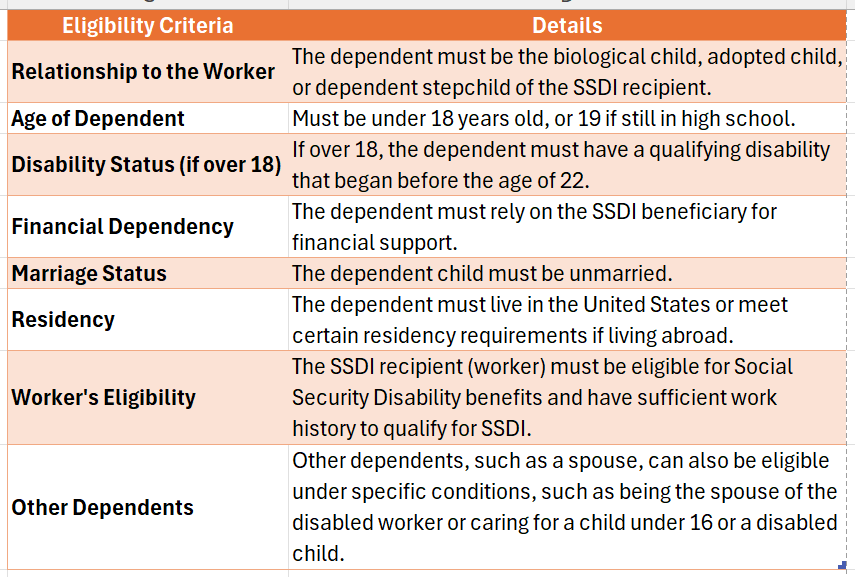Can SSDI And Dependents Receive Benefits?
Looking for trusted legal experts to handle your case? Whether it’s a complex claim or a personal issue, FreeLegalCaseReview offers free consultations and expert advice tailored to your needs. Or call us directly at 833-248-4565.
Understanding whether dependents can receive SSDI benefits is crucial for families navigating financial challenges. SSDI, or Social Security Disability Insurance, is designed to support individuals who are unable to work due to severe disabilities. But what about their dependents? Let’s explore how SSDI and dependents work together.
Who Can Be Considered a Dependent?
Dependents typically include children under 18, or up to 19 if they are still in high school. Additionally, a spouse may also qualify. This means that if a parent or spouse is receiving SSDI benefits, their dependents might be eligible for additional support.
What Conditions Automatically Qualify You For Disability
To qualify for SSDI, you must have a medical condition that meets the Social Security Administration’s strict criteria. Some common conditions include:
- Blindness
- Cancer
- Multiple Sclerosis
- Severe mental disorders
These conditions can lead to SSDI benefits not just for the individual but potentially for their dependents as well.
SSDI CT: Local Considerations
If you’re in Connecticut (CT), the process for applying for SSDI benefits is similar to other states, but local resources can help. Understanding the specific requirements and benefits available in your area can make a significant difference. Always check with local Social Security offices for guidance.
Can Dependents of SSDI Recipients Receive Benefits?

When someone receives Social Security Disability Insurance (SSDI), it’s not just about them. Many wonder, “Can dependents of SSDI recipients receive benefits?” This question is important because it can help families manage their finances during tough times. Understanding how SSDI works for dependents can make a big difference in their lives.
Yes, dependents can receive benefits! If you are an SSDI recipient, your spouse and children may qualify for additional benefits. This can include your biological children, adopted children, and even stepchildren. It’s a way to support families when a primary earner can no longer work due to disability.
Key Points to Remember:
- Eligibility: Dependents must be under 18 or between 18-19 and still in high school. They may also qualify if they are disabled before age 22.
- Amount: The benefit amount depends on the SSDI recipient’s earnings record. More earnings can mean higher benefits for dependents.
- What Conditions Automatically Qualify You For Disability: Certain conditions, like severe mental disorders or physical disabilities, can help you qualify for SSDI in Connecticut (SSDI CT). This is crucial for ensuring dependents receive the support they need.
The Importance of Dependent Benefits in SSDI Claims
When it comes to Social Security Disability Insurance (SSDI), many people wonder, “Can dependents receive SSDI benefits?” This question is crucial because it affects families who rely on the primary earner’s benefits. Understanding how SSDI works for dependents can provide peace of mind during tough times.
Who Can Be Considered a Dependent?
Dependents can include children, spouses, or even some parents. If you qualify for SSDI, your dependents may also receive benefits, which can help support your family financially. This is especially important if you are unable to work due to a disability.
What Conditions Automatically Qualify You For Disability?
To ensure you qualify for SSDI, certain conditions automatically qualify you for disability. These include severe medical issues like cancer, heart disease, or mental health disorders. If you meet these criteria, your dependents may also benefit from your SSDI claim, providing additional support during challenging times.
In states like Connecticut (SSDI CT), understanding these benefits can make a significant difference in your family’s financial stability. So, if you’re navigating the SSDI process, don’t overlook the importance of dependent benefits!
Eligibility Criteria for Dependents Under SSDI
Understanding whether dependents can receive SSDI benefits is essential for families facing financial challenges. SSDI, or Social Security Disability Insurance, supports individuals unable to work due to disabilities. But what about their dependents? Let’s dive into the eligibility criteria for dependents under SSDI.
Who Qualifies as a Dependent?
Dependents include children, spouses, and sometimes parents. To qualify, they must be related to the SSDI recipient and meet specific age or disability requirements. For instance, children under 18 or those disabled before age 22 may be eligible for benefits.
What Conditions Automatically Qualify You For Disability?
Certain medical conditions, such as severe mental disorders or spinal cord injuries, can automatically qualify individuals for SSDI benefits. If the primary beneficiary qualifies, their dependents may also receive benefits, providing crucial financial support.
Benefits for Dependents
Receiving SSDI benefits can significantly ease financial burdens for dependents, helping cover living expenses, medical costs, and education. This support offers peace of mind during tough times.
How to Apply for Benefits
To apply for dependent benefits, the primary beneficiary must first be approved for SSDI. Then, you can apply through the Social Security Administration, gathering necessary documents like birth certificates and proof of relationship.
How to Apply for SSDI Benefits for Dependents
Understanding whether dependents can receive SSDI benefits is crucial for families facing financial challenges due to disability. If a parent or guardian qualifies for SSDI, their dependents may also be eligible for benefits, providing much-needed support during tough times.
Eligibility Requirements
To apply for SSDI benefits for dependents, you first need to ensure that the primary beneficiary meets the criteria. This includes having worked enough years and having a qualifying disability. Remember, What Conditions Automatically Qualify You For Disability can vary, so check the Social Security Administration’s guidelines.
Steps to Apply
- Gather Necessary Documents: Collect Social Security numbers, birth certificates, and proof of the primary beneficiary’s disability.
- Complete the Application: You can apply online or visit your local Social Security office. Make sure to include all required information about your dependents.
- Follow Up: After submitting, keep track of your application status. SSDI CT can provide local assistance if needed.
By following these steps, you can help ensure that your dependents receive the support they need.
Ready to connect with top legal professionals? Get immediate support— Call us at 833-248-4565.
Common Misconceptions About SSDI and Dependents
When it comes to Social Security Disability Insurance (SSDI) and dependents, many families have questions. Understanding whether dependents can receive SSDI benefits is crucial for navigating financial challenges and clearing up misconceptions.
Dependents Can’t Get SSDI Benefits
A common belief is that only the disabled individual qualifies for SSDI. In reality, dependents can receive benefits too! If a parent is approved for SSDI, their children may also be eligible, providing essential financial support.
What Conditions Automatically Qualify You For Disability
Not all conditions qualify for SSDI. Common qualifying conditions include:
- Mental disorders
- Cancer
- Heart disease
- Neurological disorders Understanding these conditions helps families determine eligibility for SSDI CT benefits.
SSDI Benefits for Spouses
If a spouse is disabled and receiving SSDI, their partner may also qualify for benefits, offering crucial financial support during tough times.
Age Limits for Dependent Benefits
Dependents can receive SSDI benefits until age 18, or until age 19 if still in school, ensuring support while pursuing education.
The Importance of Documentation
Proper documentation is essential for accessing SSDI benefits for dependents. Families should gather necessary paperwork to streamline the application process.
Read Also: What Conditions Automatically Qualify You for Disability?
Navigating the SSDI Application Process with Dependents
Navigating the SSDI application process can be overwhelming, especially when dependents are involved. Understanding whether dependents can receive SSDI benefits is crucial for families facing financial uncertainty. If you’re wondering about this, you’re not alone! Many people ask, “Can Dependents Receive SSDI Benefits?” and it’s a question worth exploring.
Who Qualifies for SSDI Benefits?
When applying for SSDI, it’s essential to know that dependents can receive benefits if the primary applicant qualifies. But what conditions automatically qualify you for disability? Generally, severe medical conditions that limit your ability to work, such as cancer, heart disease, or severe mental disorders, can qualify you. This means if a parent or guardian is approved for SSDI, their dependents may also receive support.
Benefits for Dependents
Here are some key points about SSDI and dependents:
- Eligibility: Dependents can include children under 18 or disabled adult children.
- Financial Support: Benefits can help cover living expenses, ensuring that families remain stable during tough times.
- SSDI CT: In Connecticut, the process is similar, but local resources can provide additional guidance.
Understanding these aspects can ease the application process and provide peace of mind for families.
How FreeLegalCaseReview Can Help You Secure SSDI Benefits for Your Dependents
Understanding whether dependents can receive SSDI benefits is crucial for families facing financial challenges due to a disability. If you or a loved one is unable to work, knowing how SSDI and dependents work together can provide peace of mind and financial support. Let’s explore how FreeLegalCaseReview can assist you in securing these benefits for your family.
What Are SSDI Benefits for Dependents?
SSDI, or Social Security Disability Insurance, not only supports individuals with disabilities but also extends benefits to their dependents. This means that if you qualify for SSDI, your spouse and children may also receive financial assistance.
What Conditions Automatically Qualify You For Disability?
Certain conditions can automatically qualify you for SSDI. These include:
- Severe mental disorders
- Cancer
- Heart disease
- Neurological disorders Understanding these conditions can help you determine eligibility for both yourself and your dependents.
At FreeLegalCaseReview, we specialize in guiding families through the SSDI application process in Connecticut (SSDI CT). Our team can help you gather necessary documentation, understand eligibility requirements, and ensure that your dependents receive the support they need. With our expertise, you can navigate the complexities of SSDI and focus on what truly matters—your family’s well-being.
Don’t wait to secure the legal representation you deserve. Visit FreeLegalCaseReview today for free quotes and tailored guidance, or call 833-248-4565 for immediate assistance.
You can also visit LegalCaseReview to find the best Lawyer.
FAQs
1. Can dependents receive benefits under SSDI?
Yes, dependents of an SSDI recipient may be eligible for benefits. This includes children, spouses, and in some cases, adult children with disabilities.
2. Who qualifies as a dependent for SSDI benefits?
Eligible dependents typically include the spouse of the disabled worker, children under the age of 18 (or up to 19 if still in high school), and adult children with disabilities who were disabled before the age of 22.
3. How much can my dependents receive under SSDI?
The amount dependents can receive varies depending on the disabled worker’s earnings history and the Social Security benefits they are entitled to. Generally, each dependent can receive up to 50% of the worker’s SSDI benefit amount.
4. Can a divorced spouse receive SSDI benefits as a dependent?
Yes, a divorced spouse may be eligible for SSDI benefits if the marriage lasted at least 10 years, the spouse is not remarried, and the disabled worker is entitled to SSDI benefits.
5. What happens to my dependents’ SSDI benefits if I die?
If the SSDI recipient passes away, eligible dependents may be able to receive survivor benefits, including children, a spouse, or even an ex-spouse under certain conditions.
6. Can adult children with disabilities receive SSDI as dependents?
Yes, adult children with disabilities may be eligible for SSDI benefits as dependents if their disability began before the age of 22. These benefits can continue for the lifetime of the child, provided they meet the necessary criteria.




